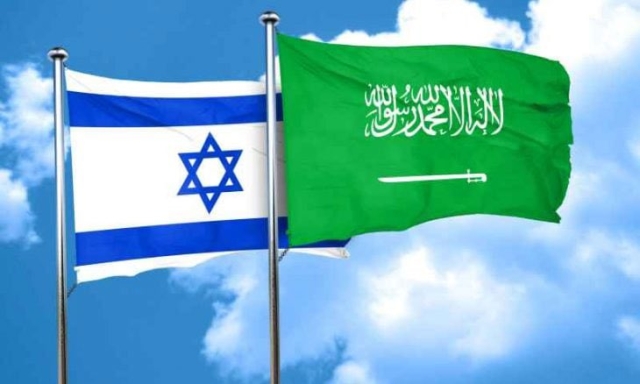In an epoch-defining moment that speaks to the changing dynamics of Middle Eastern geopolitics, a high-profile delegation of Israeli diplomats recently set foot in Saudi Arabia. The event is a far cry from the isolationist strategies of yesteryear that made such interactions seem not just improbable, but virtually impossible. Consisting of representatives from the Israeli Foreign Ministry and the Antiquities Authority, the delegation was in Saudi Arabia to attend a UNESCO World Heritage Committee meeting.
The delegation's visit, which was publicized firat by Axios reporter Barak Ravid, signifies Israel's first official, publicly-acknowledged diplomatic venture into Saudi territory. This remarkable episode highlights a new chapter in regional diplomacy, one that perhaps signals an evolving paradigm towards greater transparency and stability, a marked departure from the shadowy nature of Middle Eastern politics.
The people of Israel 🇮🇱 thank the leaders and people of Saudi Arabia 🇸🇦 for warmly welcoming their delegation to the @UNESCO World Heritage Committee meeting. pic.twitter.com/6QuARrWbq1
— Avi Kaner ابراهيم אבי (@AviKaner) September 10, 2023
A pressing matter on the delegation's agenda was the controversial proposal to list Jericho as a Palestinian heritage site. The city of Jericho, among the world’s oldest continually inhabited locales, is more than just a historical landmark; it is a potent symbol in the Israeli-Palestinian conflict. Its designation has ramifications that extend well beyond the scope of cultural heritage into the intricate maze of political negotiations and territorial rights. The Palestinians have long sought to usurp the narrative of Israel's ancient kingdoms and in turn, eliminate the Jewish connection to the land. Appealing to UNESCO and other agencies to help them legitimize their claims on ancient Israelite and Judean sites has been a cornerstone of this effort.
Here, it’s important to highlight a concerning trend: the appropriation of Jewish heritage, history, and culture within Palestinian narratives. This isn't a phenomenon restricted to debates about heritage sites. It has been embedded in the Palestinian strategy to dilute, or even rewrite, historical narratives concerning Jewish ties to the land of Israel. The issue of cultural appropriation in this context goes far beyond casual disregard for cultural origins. It reaches into the realms of denial and revisionism, spearheaded by Palestinian leaders like Mahmoud Abbas, who remarkably claims Palestinians are the biblical Canaanites, and his predecessor Yasser Arafat, who professed Palestinians are the Jebusites—both groups that have been extinct for millennia.
.@ayidindixieland : "The Gospel of Linda Sarsour is one of the most ancient documents attesting to the existence of the Palestinian nation, descendants of the Canaanites, Jebusites, and Hittites, who fruitlessly resisted the Ashkenazi Zionist invaders" https://t.co/Of4pomgNEd
— (((David Lange))) (@Israellycool) July 9, 2019
This selective retelling stands in stark contrast to a well-documented, millennia-long Jewish history that is intimately tied to the Land of Israel. Indeed, for Jews, the concept of nationhood and faith is intrinsically bound to their connection to this land. Archaeological evidence throughout Israel attests to this long-standing relationship, making it a cornerstone of Jewish identity. The meeting in Saudi Arabia is telling as it is there, in the heart of the Arabian Kingdom where much of the anti-Israel activities began over 100 years ago, that the delegation will try and reclaim Jewish linkage to the holy sites in Judea and Samaria.
The significance of the delegation's mission is amplified by the context of Israel's recent overtures towards normalization with Saudi Arabia. A week prior, Saudi Arabia hosted a group of Israeli businessmen in Dammam, marking another first in the establishment of formal relations. At the event, Saudi officials made it clear that their country stands in a league of its own compared to other signatories of the Abraham Accords, given its stewardship of Islamic holy sites in Mecca and Medina.
Saudi Arabia's unique geopolitical standing could act as a bellwether for other Arab and Muslim nations. As Saudi representatives emphasized, normalization would not just legitimize Saudi-Israeli relations but could catalyze a ripple effect, encouraging other nations to step off the sidelines and engage with Israel officially.
"The Saudis had reportedly refused to sign the agreement in June, protesting Israel’s participation in the conference, but UNESCO director-general Audrey Azoulay was said to insist that Israeli representatives be granted entry.https://t.co/MKkfSjjNpq
— Jerusalem of Iron 🇮🇱 עם ישראל חי (@jerusalemofiron) September 10, 2023
To sum it up, these unfolding diplomatic efforts signify more than a mere changing of attitudes; they mark a seismic shift in the Middle East's political and cultural framework. The Israeli delegation's ground-breaking visit to Saudi Arabia, along with the ongoing conversations surrounding normalization, holds the potential to revolutionize cooperation in the region. It prompts one to consider the tantalizing array of transformative possibilities not just for Israel and Saudi Arabia, but for the broader Middle East as well.


